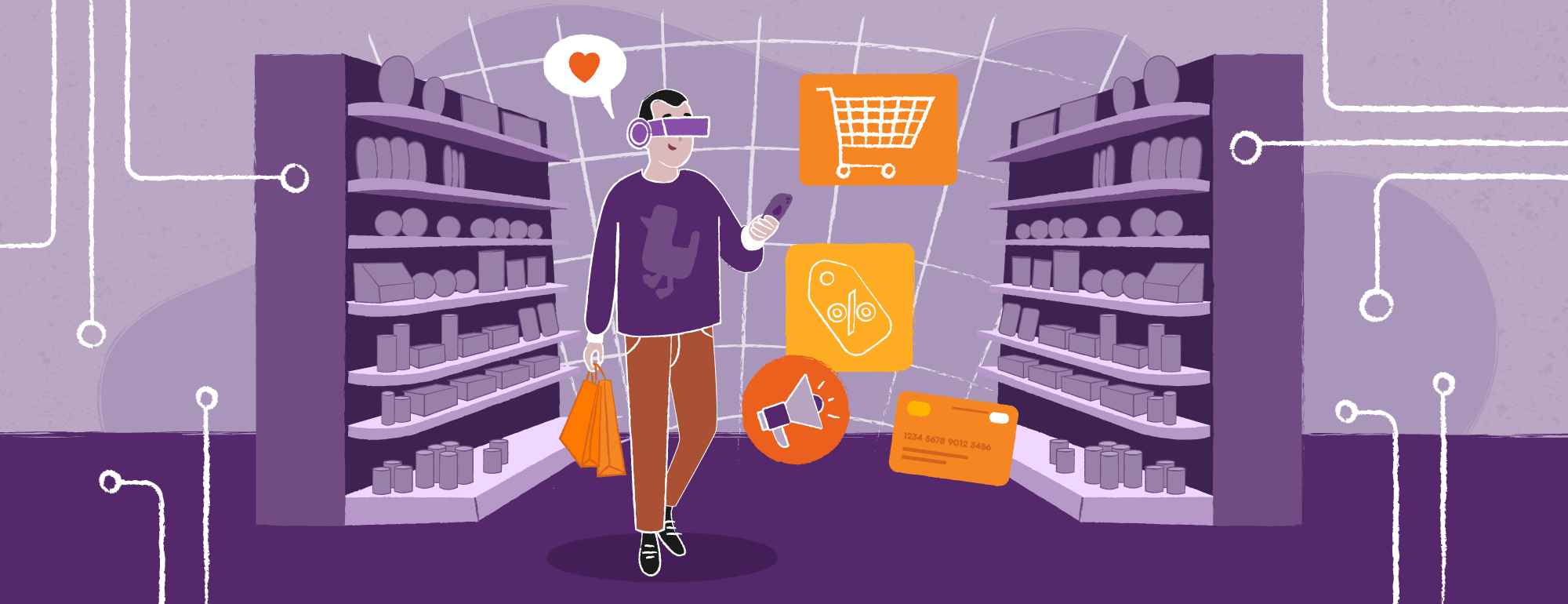Phygital / The New Era of Commerce
With the ongoing globalization, technology is becoming increasingly ubiquitous, with the digital and physical worlds intertwining more than ever. Blurring the boundaries between these dimensions has resulted in the emergence of a trend called “phygital.”
It describes the synergistic integration of these two worlds to create new, innovative experiences for customers. In this article, we will take a closer look at the phenomenon of phygital, its applications in various industries, and the benefits and challenges it brings.
Connection of Physical and Digital Worlds
In the past, e-commerce was understood solely as a virtual experience, where customers made purchases through websites or mobile apps. The options were either visiting a physical store or shopping online. However, over time, companies began to focus on integrating various sales channels, as customers expected it, and the omnichannel approach gained importance.
Phygital (a term coined from the words “physical” and “digital”) goes a step further than the omnichannel model, where different sales channels are integrated within one customer service system. In the case of phygital, consumers can almost simultaneously use online and offline solutions to make purchases. One of the first examples of this was the QR code system, which enabled users to access additional information online by scanning codes placed on products or in public places. Thanks to this, what was presented on interactive screens was connected to the real world.
Today, the possibilities are much greater due to the development of technologies such as Augmented Reality (AR) and Virtual Reality (VR) and their implementation in e-commerce solutions. With AR, customers can, for example, try on clothes or display products in their surroundings using smartphones, resulting in more realistic and personalized shopping experiences. Meanwhile, VR allows customers to take virtual tours of online stores, giving them a sense of physical presence and better product understanding.
Key Elements of Phygital
The phygital trend focuses on physical and digital elements: integration of physical and digital space, personalization of experiences, and real-time data utilization. An example of integrating physical and digital space may be a store that uses interactive touch screens to allow customers to browse product assortments and check the availability of sizes and colors. Personalization of experiences includes recommendation systems that suggest appropriate products based on customer purchase history. Real-time data utilization allows for monitoring customer behavior in brick-and-mortar stores and adjusting offerings to their preferences.
Integration of Online and Offline Experiences
Phygital involves seamlessly integrating online and offline shopping experiences. This means that customers can freely switch between different sales channels, benefiting from the advantages of each.
Personalization
Through data analysis and customer behavior, companies can provide personalized offers and shopping experiences that better meet individual customer needs and preferences.

Digital Technology
Technologies such as AR, VR, IoT (Internet of Things), or artificial intelligence are key elements of phygital. They enable the creation of innovative solutions that integrate the physical and digital worlds, allowing customers more interactive and immersive shopping experiences.
Availability
The concept of phygital assumes that the shopping experience can be available to customers anytime, anywhere. As a result, consumers can freely use various sales channels, such as brick-and-mortar stores, online stores, mobile applications, or social media, depending on their preferences and needs.
Integration of Customer Service Systems
A key element of Phygital is integrating different customer service systems, such as payment systems, inventory management, or customer service, within one coherent ecosystem. This allows companies to provide customers with uniform and personalized shopping experiences at every stage of their interaction with the brand.
Applications of Phygital in Different Industries
Phygital finds applications in various industries, including retail, entertainment, tourism, or education. Stores offer interactive product stands where customers can test devices and consult with experts. There are also applications using augmented reality technology for visualizing furniture in customers’ home spaces before purchase. Clothing stores offer solutions for virtual fitting and product customization.
Nike
Nike utilizes AR technology in its mobile app, allowing customers to try on shoes virtually before making an online purchase. Additionally, the brand has opened stores called “Nike Live,” which combine physical and digital experiences through interactive touch screens providing access to personalized content and services.
IKEA
The IKEA Place mobile app allows customers to virtually furnish rooms and try out furniture and accessories arrangements before making a purchase. With this app, customers can see how selected furniture will look in their living spaces, aiding purchase decisions. Moreover, IKEA is experimenting with the concept of virtual stores where customers can browse and purchase products using VR goggles, providing an interactive shopping experience without leaving home.
McDonald’s
At McDonald’s, customers can use a mobile app that enables online ordering and payment before arriving at the restaurant, speeding up the service process and increasing convenience. Additionally, restaurants are equipped with touch screens for ordering, allowing for personalized orders and easier menu browsing, as well as convenient ordering and payment.
Glossier
The cosmetic brand Glossier has combined online and offline actions by creating a friendly space resembling a playground, where customers are provided not only with the opportunity to purchase but also with great fun. In such an environment, consumers can experiment with makeup, take selfies in aesthetic mirrors, and engage with the brand in a way that would be more challenging to achieve exclusively online. Additionally, the salons limit the number of customers at one time, allowing for a pleasant atmosphere.
Benefits and Challenges of Phygital
Phygital brings many benefits for both customers and businesses. For customers, this means more personalized shopping experiences, quicker access to information, and greater convenience. For businesses, Phygital can translate into increased sales, better understanding of customers, and increased loyalty.
- Personalization of customer experience: Phygital enables companies to better personalize shopping experiences by collecting customer data and tailoring offers to their preferences.
- Integration of online and offline: Phygital allows for seamless transition between online and offline experiences, ensuring brand consistency and facilitating the purchasing process.
- Increased customer engagement: interactive technologies can increase customer engagement by providing them with more immersive and engaging shopping experiences.
- Optimization of retail space: by using technology to present products, collect customer behavior data, and optimize store layouts.
- Increased conversion: by enhancing customer engagement and personalizing shopping experiences, phygital experience can help increase conversions and generate higher revenues for companies.
However, implementing phygital also comes with challenges such as the need to invest in new technologies, ensuring customer data security, and integrating different systems. Companies must also regularly conduct research to see how implemented digital solutions affect the shopping experience of customers.
- Implementation costs: implementing advanced technologies always requires resource commitment, both financially and temporally, which can be challenging for some companies, especially smaller ones.
- Data security: collecting customer personal data for personalizing shopping experiences may raise concerns about privacy and data security, requiring appropriate data protection measures.
- Infrastructure integration: integrating online and offline systems can be complex and require significant investment in developing the appropriate technological infrastructure.
- Customer education: some customers may need education on the benefits and usage of phygital technologies, requiring additional efforts from companies.
- Continuous adaptation to changes: the world of technology is constantly changing, which means that companies must constantly adapt to new trends and innovations to maintain competitiveness in the phygital era.
The Future of Physical and Digital Experiences
The future of phygital looks extremely promising, as the trend of integrating the physical world with the digital one continues to evolve, driven by increasingly advanced technologies such as virtual reality, augmented reality, or artificial intelligence, and growing customer expectations.
Phygital allows for creating interactive and exciting customer experience that evoke positive emotions. These experiences can be crucial for building an emotional bond with the brand and increasing customer loyalty.








